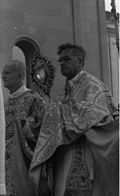List of bishops of Freising and archbishops of Munich and Freising
The following people were bishops, prince-bishops or archbishops of Freising or Munich and Freising in Bavaria:

Bishops of Freising
- St. Corbinian (724–730); founded the Benedictine abbey in Freising, although the diocese was not organized until 739)
- Establishment of episcopal organisation in Old Bavaria by Saint Boniface in 739.
- Erembert (739–747/748; sometimes referred to as Corbinian's half brother[1])
- Joseph of Freising, also known as Joseph of Verona (747/748–764)
- Arbeo (764–783/784)
- Atto (783/784–810/811)
- Hitto (810/811–834/835)
- Erchanbert (835/836–854)
- Anno (854/855–875)
- Arnold (875–883)
- Waldo (883/884–903/906)
- Utto (904/906–907)
- Dracholf (907–926)
- Wolfram (926–937)
- St. Lantpert (937/938–957)
- Abraham (956/957–993/994)
- Gottschalk of Hagenau (994–1005)
- Egilbert of Moosburg (1005–1039)
- Nitker (1039–1052)
- Ellenhard, Count of Meran (1052–1078)
- Meginward, Count of Scheyarn (1078–1098)
- Henry I of Freising, also known as Henry I of Ebersdorf (1098–1137)
- Otto I (1137–1158)
- Albert I of Harthausen (1158–1184)
- Otto II (1184–1220)
- Gerold of Waldeck (1220–1230)
- Conrad I of Tölz and Hohenburg (1230–1258)
- Conrad II Wildgraf of Dhaun (1258–1278/1279)
- Frederick of Montalban (1279–1282)
- Elevation to a Hochstift i.e. Prince-Bishopric in 1294
Prince-bishops of Freising


- Waldgrave Emicho (1282–1311)
- Gottfried of Hexenagger (1311–1314)
- Conrad III the Sendlinger (1314–1322)
- John I Wulfing (1323–1324)
- Conrad IV of Klingenberg (1324–1340)
- John II Hake (1340–1349)
- Albert II of Hohenberg (1349–1359)
- Paul of Jägerndorf (1359–1377)
- Leopold of Sturmberg (1377–1381)
- Berthold of Wehingen (1381–1410)
- Conrad V of Hebenstreit (1411–1412)
- Hermann of Cilli (1412–1421)
- Nicodemus of Scala (1421/1422–1443)
- Henry II of Schlick (1443–1448)
- John III Grünwald (elected 15 Jan 1448; died 2 Dec 1452)
- John IV Tulbeck (elected Jan 1453; resigned Nov 1473)
- Sixtus of Tannberg (elected 12 Jan 1473; died 14 Jul 1495)
- Ruprecht of the Palatinate (elected 1 Aug 1495; resigned 3 Dec 1498)
- Philip of the Palatinate (elected 1498; died 5 Jan 1541)
- Henry II of the Palatinate (succeeded 5 Jan 1541; died 3 Jan 1552)
- Leo Lösch of Hilkertshausen (elected 15 Feb 1552; died 8Apr 1559)
- Moritz of Sandizell (elected 12 Jun 1559; died 18 Oct 1566)
- Ernest of Bavaria (elected 18 Oct 1566; died 17 Feb 1612)
- Stephen of Seiboldsdorf (elected May 1612; died 16 Jan 1618)
- Veit Adam of Gepeckh von Arnsbach (elected 12 Feb 1618; died 8 Dec 1651)
- Albert Sigismund of Bavaria (1651/1652–1685)
- Joseph Clemens of Bavaria (succeeded 4 Nov 1685; resigned 29 Sep 1694)
- John Francis Eckher of Kapfing and Liechteneck (elected 29 Jan 1694/1695; died 23 Feb 1727)
- Cardinal John Theodore, Duke of Bavaria (succeeded 23 Feb 1727; died 27 Jan 1763)
- Clemens Wenceslaus, Duke of Saxony (elected 18 Apr 1763; resigned 20 Aug 1768)
- Louis Joseph Freiherr of Welden on Laupheim and Hohenaltingen (electected 23 Jan 1768; died 15 Mar 1788)
- Maximilian Prokop of Toerring-Jettenbach elected 26 May 1788; died 30 Dec 1789)
- Joseph Conrad Freiherr of Schroffenberg, C.R.S.A. (elected 1 Mar 1790; died 4 Apr 1803). After his death, the temporal authority of the bishop was mediatised and abolished by the Elector of Bavaria.
- Sede vacante as a result of the secularisation under Napoleonic rule (1803–1821)
- Joseph James of Heckenstaller, priest, vicar capitular (appointed 14 Apr 1803); was also named first a vicar general and, later, a papal delegate as "vicar capitular apostolic", but never raised to the episcopacy; resigned 16 Feb 1818. The episcopal functions were exercised by auxiliary bishop, Johann Nepomuk Wolf.
- Elevation to an archdiocese in 1817/1821
Archbishops of Munich and Freising

- Lothar Anselm Freiherr von Gebsattel (appointed 16 February 1818; confirmed soon, but at first only apostolic administrator; archbishop 1 November 1821; died 1 October 1846)
- Karl August Cardinal Graf von Reisach (succeeded 1 October 1846; cardinal 17 December 1855; resigned 19 June 1856)
- Gregor (Leonhard Andreas) von Scherr, O.S.B. (appointed 6 January 1856; died 24 October 1877)
- Antonius von Steichele (appointed 30 April 1878; died 9 October 1889)
- Antonius von Thoma (appointed 23 October 1889; died 24 November 1897)
- Franz Joseph von Stein (appointed 24 December 1897; died 4 May 1909)
- Franziskus Cardinal von Bettinger (appointed 23 May 1909; cardinal 25 May 1914; died 12 April 1917)
- Michael Cardinal von Faulhaber (appointed 26 May 1917; cardinal 7 March 1921; died 12 June 1952)
- Joseph Cardinal Wendel (appointed 9 August 1952; cardinal 12 January 1953; died 31 December 1960)
- Julius August Cardinal Döpfner (appointed 3 July 1961, already a cardinal; died 24 July 1976)
- Joseph Cardinal Ratzinger (appointed 24 March 1977; cardinal 27 June 1977; resigned 15 February 1982), subsequently Pope Benedict XVI
- Friedrich Cardinal Wetter (appointed 28 October 1982; cardinal 25 May 1985; retired 2 February 2007)
- Reinhard Cardinal Marx (appointed 30 November 2007; cardinal 20 November 2010)
See also
References
- ^ Maß, Josef (2005). "Der hl. Bonifatius und das Bistum Freising". Beiträge zur altbayerischen Kirchengeschichte (in German). 48: 9–27.
Sources
- Alois Weissthanner (ed.): Die Regesten der Bischöfe von Freising. Vol. I: 739–1184. Continued and completed by Gertrud Thoma and Martin Ott (= registers of Bavarian history), C.H.Beck. Munich, 2009, ISBN 978-3-406-37104-2. (Recension)
External links

Wikimedia Commons has media related to Bishops of the Roman Catholic Archdiocese of Munich and Freising.
- "diocese/dmunc". Catholic-Hierarchy.org. David M. Cheney.











